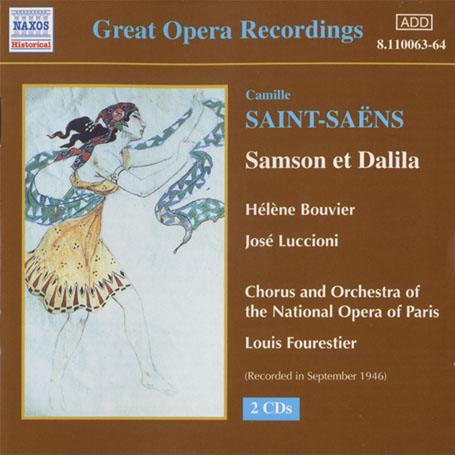Saint-Saëns Samson et Dalila
This first recording of the complete opera is also notable for its fine solo singing – from Bouvier in particular – and for Fourestier’s firm yet sensitive direction
View record and artist detailsRecord and Artist Details
Composer or Director: Camille Saint-Saëns
Genre:
Opera
Label: Naxos Historical
Magazine Review Date: 12/2000
Media Format: CD or Download
Media Runtime: 142
Mastering:
Mono
ADD
Catalogue Number: 8 110063/4

Tracks:
| Composition | Artist Credit |
|---|---|
| Samson et Dalila |
Camille Saint-Saëns, Composer
Camille Saint-Saëns, Composer Charles Cambon, Abimélech, Bass Hélène Bouvier, Dalila, Mezzo soprano Henri Médus, Old Hebrew, Bass José Luccioni, Samson, Tenor Louis Fourestier, Conductor Paris National Opera Chorus Paris National Opera Orchestra Paul Cabanel, High Priest, Baritone |
Author: rnichols
Parisians suffering the German Occupation at least had the chance to go to the Opera and see Helene Bouvier as Amneris, as Fricka in Das Rheingold, as Margared in Le roi d’Ys, and as Emilia in Otello with Jose Luccioni in the title-role.
Ward Marston, in his insert-notes, has some right to be puzzled that this 1946 recording of Samson et Dalila should have been the first complete recording of the opera, but a look at the Paris Dalilas of the 1930s reveals no exceptional interpreters and certainly none to match the current Samsons of Paul Franz and Georges Thill.
Bouvier was well worth waiting for. She made her Opera debut as Dalila in the summer of 1939 and was one of the house’s favourite mezzos until her early retirement from the stage in the early ’50s. Hers was not the biggest of voices, although her top B flat towards the end of the Act 2 duet is thrillingly full-blooded. More striking is her use of words and her absolute control of tone, notably in diminuendos (as on ‘bras’, just before Samson joins her in ‘Ah! reponds’) where her intonation is rock steady with not a hint of breathiness. Her sound is seduction itself and in ‘Printemps qui commence’ my finger hovered continually over the replay button. Best of all, she phrases wonderfully.
Luccioni has not quite her variety of tone, and he loses the pitch for a couple of bars shortly before ‘Mon coeur s’ouvre’, but otherwise he is a splendid partner, heroic in the First Act, tender in the Second, movingly plangent in the Third. The top of the voice has the direct, no-nonsense quality of the motor mechanic he had once been, and his French, like Bouvier’s, is a joy. The three bass roles are all finely sung, as are the chorus parts, although the recording, even after Ward Marston’s expert labours, does them few favours.
Holding the whole enterprise in an iron grip is Louis Fourestier, one of the most effective and undervalued of French conductors. Rhythms are taut, entries confident, rests and orchestral balance carefully judged. Any lover of fine, intelligent singing will want to own this disc.'
Ward Marston, in his insert-notes, has some right to be puzzled that this 1946 recording of Samson et Dalila should have been the first complete recording of the opera, but a look at the Paris Dalilas of the 1930s reveals no exceptional interpreters and certainly none to match the current Samsons of Paul Franz and Georges Thill.
Bouvier was well worth waiting for. She made her Opera debut as Dalila in the summer of 1939 and was one of the house’s favourite mezzos until her early retirement from the stage in the early ’50s. Hers was not the biggest of voices, although her top B flat towards the end of the Act 2 duet is thrillingly full-blooded. More striking is her use of words and her absolute control of tone, notably in diminuendos (as on ‘bras’, just before Samson joins her in ‘Ah! reponds’) where her intonation is rock steady with not a hint of breathiness. Her sound is seduction itself and in ‘Printemps qui commence’ my finger hovered continually over the replay button. Best of all, she phrases wonderfully.
Luccioni has not quite her variety of tone, and he loses the pitch for a couple of bars shortly before ‘Mon coeur s’ouvre’, but otherwise he is a splendid partner, heroic in the First Act, tender in the Second, movingly plangent in the Third. The top of the voice has the direct, no-nonsense quality of the motor mechanic he had once been, and his French, like Bouvier’s, is a joy. The three bass roles are all finely sung, as are the chorus parts, although the recording, even after Ward Marston’s expert labours, does them few favours.
Holding the whole enterprise in an iron grip is Louis Fourestier, one of the most effective and undervalued of French conductors. Rhythms are taut, entries confident, rests and orchestral balance carefully judged. Any lover of fine, intelligent singing will want to own this disc.'
Discover the world's largest classical music catalogue with Presto Music.

Gramophone Digital Club
- Digital Edition
- Digital Archive
- Reviews Database
- Full website access
From £8.75 / month
Subscribe
Gramophone Full Club
- Print Edition
- Digital Edition
- Digital Archive
- Reviews Database
- Full website access
From £11.00 / month
Subscribe
If you are a library, university or other organisation that would be interested in an institutional subscription to Gramophone please click here for further information.




